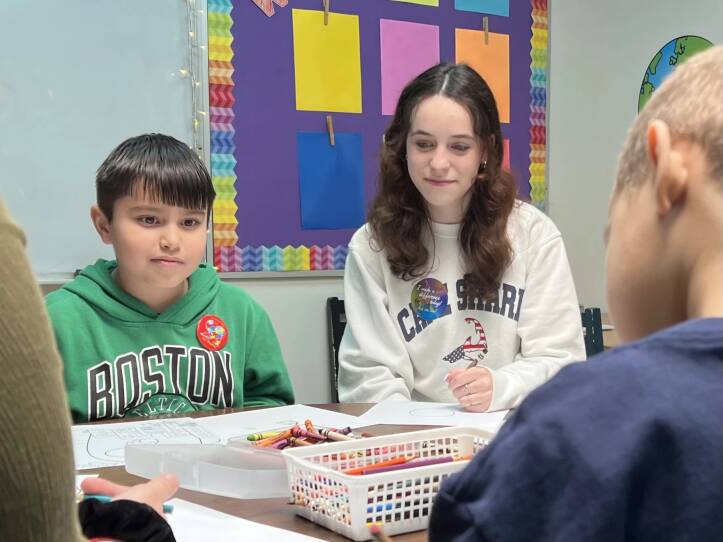“Hi, guys!”
A student at Harwich Elementary School holds up a picture he drew, eager to show it to the four teenagers who just entered the room.
“Look at this! I made it,” he says.
The teens' arrival sets off a flurry of delighted chatter from three first graders seated around a circular table. The table is low to the ground for the children, but the high school students join them.
They’re drawing and coloring.
This is the room at Harwich Elementary where English language learners have their supplemental lessons. Two of the first-graders are native Portuguese speakers, and one Spanish.
But for this session, the teachers are just observing.

“This is for you,” a boy says, handing his picture to Talia Perez, who will be a senior this fall at Monomoy Regional High School.
“It is?” she says. “Thank you!”
The high school students sought out these meetups as a way to help young newcomers feel welcome on Cape Cod and connected to their learning. They’ve started a club called RISE; the name is an acronym for Refugee and Immigrant Students Engagement.
The idea came from Sophie Anderson, a rising senior at Barnstable High School. She read about the migrants sent to Martha’s Vineyard at the behest of Florida Governor Ron DeSantis.
“They were people being used as, you know, pawns in someone's political game,” she says. “And so I started the club because of that, because I — I thought that as students on Cape Cod, we should take some responsibility for the immigrants that are also here, because we're all the same community.”
Her dad, a teacher at Monomoy, brought the idea to his school. Students there embraced it, and both schools, Monomoy and Barnstable, started their chapters over the winter.
Each club visits an elementary school in the club's school district, either once a week or every other week.
The teens say, from the first meeting, the kids loved it.
Jean Carlos Chaves came from El Salvador via Nantucket. Thaila de Souza’s family is from Brazil. And teachers say the newest to the language is Pedro de Sena, also from Brazil.

Pedro talks eagerly. He tells the others he’s turning 7 the next day. And he talks about his drawing, which looks like a Transformer robot. He starts to roll the “r,” but then stops and makes it sound like an English “r.”
“My picture is a ro — robot,” he says. “Very big. Is a car. Very big.”
Rafael Abreu, who will be a senior at Monomoy in the fall, switches between fluent Portuguese and English when he talks with the kids.
At one point, he challenges Pedro to show the others how he can beatbox. They banter about the idea in both languages and then laugh.
Abreu used to be a language learner in the same room, he said, “so it’s just good to come over here and just show them, like, everything's okay. There's kids like them, and they ended up fine.”
RISE Club member Emily Gray says drawing with the children becomes a vehicle for word games and vocabulary.
“I draw something and they have to, like, guess it,” she says. “So I think that's like a good way for them to practice, like, speaking English and like connecting with their peers.”
Before the teenagers arrived, the English-language teachers had a moment to talk about the big picture of the program.
They say in the future, they’d like to see the RISE Club connect with older students — in middle school or upper elementary — because that age group tends to need more support.

But for now, it’s working, says teacher Nancy Capen. Plus, the newcomers are getting to know one another.
“They're in separate classrooms, so it's good to get them together … and build more of that community with each other,” she says. “It really has blossomed into — the students really look forward to when they come, and ask for when they're coming back."
As the session comes to an end, everyone seems reluctant to go.
“I don’t want to leave!” one of the children says as Capen urges them not to miss their buses.
“They’ll come back,” she says.
On his way out, first grader Jean Carlos, whose conversation seemed tentative earlier, suddenly turns to the interviewer with a clear and direct question.
“Were you nervous when it was your first day?” he says.
Yes.
We’re probably all nervous on our first day.
But for these children who are new to the United States, a few Cape Cod teenagers are making the adjustment a little less scary — and a little more fun.





